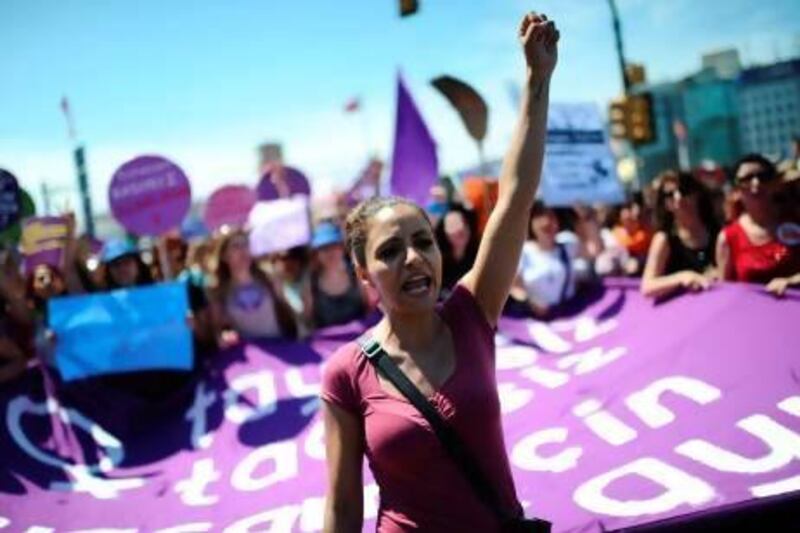ISTANBUL // A week of unprecedented anti-government demonstrations has changed Turkish politics, creating a new generation of political activists and challenging Recep Tayyip Erdogan's tight grip on domestic policy.
Analysts expect the protests to have profound consequences for the way political decisions are taken and discussed in the future.
"A new baby has been born," Koray Ozdil, a sociologist at the Turkish Economic and Social Studies Foundation (Tesev) in Istanbul, told The National yesterday. "There is a new social movement that will establish its own identity."
Thousands of demonstrators have been occupying the Gezi Park in downtown Istanbul for a week to block a government building project there.
A heavy-handed response from police on May 31 against protesters trying to save trees in the park mushroomed into the fiercest wave of unrest since Mr Erdogan came to power 10 years ago.
Three people have died and thousands have been injured in demonstrations that spread across the country against what many see as the increasing authoritarianism of the Erdogan government.
After days of talking tough and dismissing demonstrators as "vandals", Mr Erdogan appeared to change tack on Friday, calling on activists to work with him to protect trees.
"If you want to build a partnership for the environment, come and build it with your prime minister," he said in a televised speech at a meeting with EU officials in Istanbul.
Addressing environmentalists among the demonstrators as "my brothers", he assured them that the government was not planning to build a shopping mall in Gezi Park, a major concern of the protesters.
The Istanbul Stock Exchange, which fell by 6 per cent on Thursday after hawkish remarks by Mr Erdogan, closed up more than 3 per cent following the prime minister's statement on Friday that was seen as the first indication of a more conciliatory stance by the prime minister. Mr Erdogan met members of his ruling Justice and Development Party (AKP) yesterday to discuss the protests.
Mr Ozdil said the current political landscape in Turkey was not equipped to respond to demands brought forward by a movement that was independent of political parties.
While it is unlikely that the movement will coalesce into a unified organisation, it represents a new reality for Turkey, he said. In the longer term, the protests could form the basis of an increased campaign for civil liberties.
"No political actor can act without taking the impact of this group into account," Mr Ozdil said. "The government has to be more sensitive to the demands of this group seeking and protecting its civil rights - at least try not to use a political discourse that would alienate them."
With almost 50 per cent of the vote in the last general elections in 2011, Mr Erdogan's AKP is the dominant political force in Turkey and has nothing to fear from a weak and divided opposition.
Mensur Akgun, a political scientist at Istanbul's Kultur University, thinks that Mr Erdogan could now be facing stronger headwinds from protesters outside parliament.
"Many things in Turkish politics will not be the same after this crisis," he said on Twitter yesterday.
Writing in yesterday's Star newspaper, Mr Akgun predicted that politicians would have to take views and demands expressed by civil society much more seriously in future.
"Civil protests have become an integral part of politics," he wrote, adding that politicians ignored this "new sociological reality" at their peril.
Mr Ozdil said one possible outcome was that Mr Erdogan's government could scale down its ambitious programme of urban transformation that has turned parts of Istanbul into huge construction sites.
A poll conducted by Istanbul's Bilgi University showed that roughly two out of three protesters in Gezi Park were between 19 and 30 years old. More than half of them said this was the first time they took part in a protest.
Strolling through Gezi Park, Savas Halvasi, 50, a tourism manager who supports the protests, said the unrest was an introduction to politics for many of the young demonstrators.
"Before this, many had nothing to do with politics," he said. "Now they are all politicised. That is a gain for Turkey."
Nilufer Gole, a Turkish sociologist teaching in France, compared the Turkish protest movement to the student unrest in France in 1968, which was directed against the government of Charles de Gaulle.
"Like the '68 movement, the Gezi Park movement is an unrest movement that says 'enough' to a 10-year government that is centralising power in one person," she wrote in a blog for the Turkish internet news portal T24.
"The Gezi movement has shown that we have reached a new threshold in democracy," she wrote. "A new [definition of] citizenship is being tried out."






